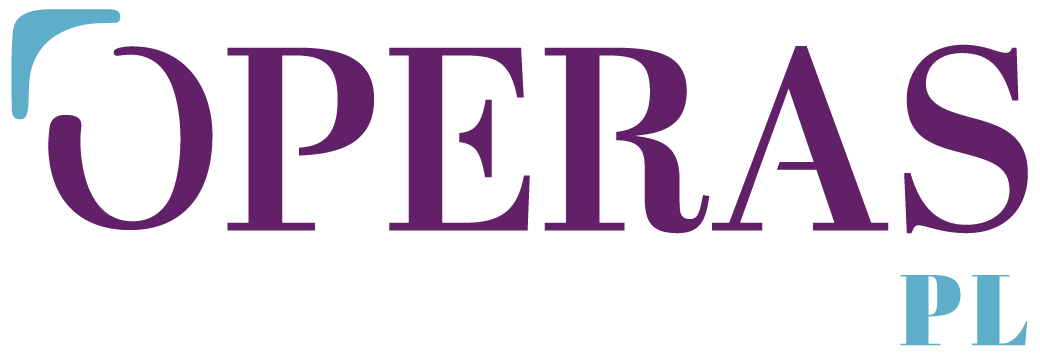W dniach 3–4 grudnia 2025 roku w Brukseli miała miejsce pogłębiona debata o przyszłości komunikacji nauki w Europie. Konferencja „Diamond ERA: Fostering Openness in the European Research Area”, zorganizowana przez Centrum Humanistyki Cyfrowej IBL PAN oraz Biuro Promocji Nauki PolSCA PAN, we współpracy z Komitetem Nauk o Literaturze PAN i infrastrukturą badawczą OPERAS, zgromadziła w siedzibie Stałego Przedstawicielstwa RP przy UE szerokie grono interesariuszy: od decydentów z Komisji Europejskiej, przez grantodawców, aż po bibliotekarzy i twórców infrastruktury.
Moment organizacji wydarzenia nie był przypadkowy. Konferencja odbyła się w gorącym okresie negocjacji nad założeniami kolejnego programu ramowego (FP10) oraz prac nad przyszłą legislacją o Europejskiej Przestrzeni Badawczej (ERA Act). Ta zbieżność terminów stworzyła unikalną szansę („policy window”), aby trwale wpisać model Diamentowego Otwartego Dostępu (Diamond OA) w fundamenty prawne europejskiej nauki. Celem spotkania było więc nie tylko teoretyzowanie o otwartości, ale wypracowanie konkretnych mechanizmów, które uczynią Diamond OA niezbywalnym elementem europejskiego ładu naukowego.
Preludium: głos nauki w Parlamencie Europejskim
Wydarzenie otworzyło zamknięte spotkanie z europarlamentarzystami z kilkukomisji parlamentarnych, dla których istotne są sprawy nauki, w tym Przewodniczącym Komisji ITRE – Posłem Borysem Budką (EPP), Wiceprzewodniczącym Komisji CULT – Posłem Bogdanem Zdrojewskim (EPP) jak i członkinią tej komisji — Posłanką Joanną Schering-Wilgus (SD) oraz Posłem Łukaszem Kohutem (EPP, w zastępstwie w Komisji CULT).
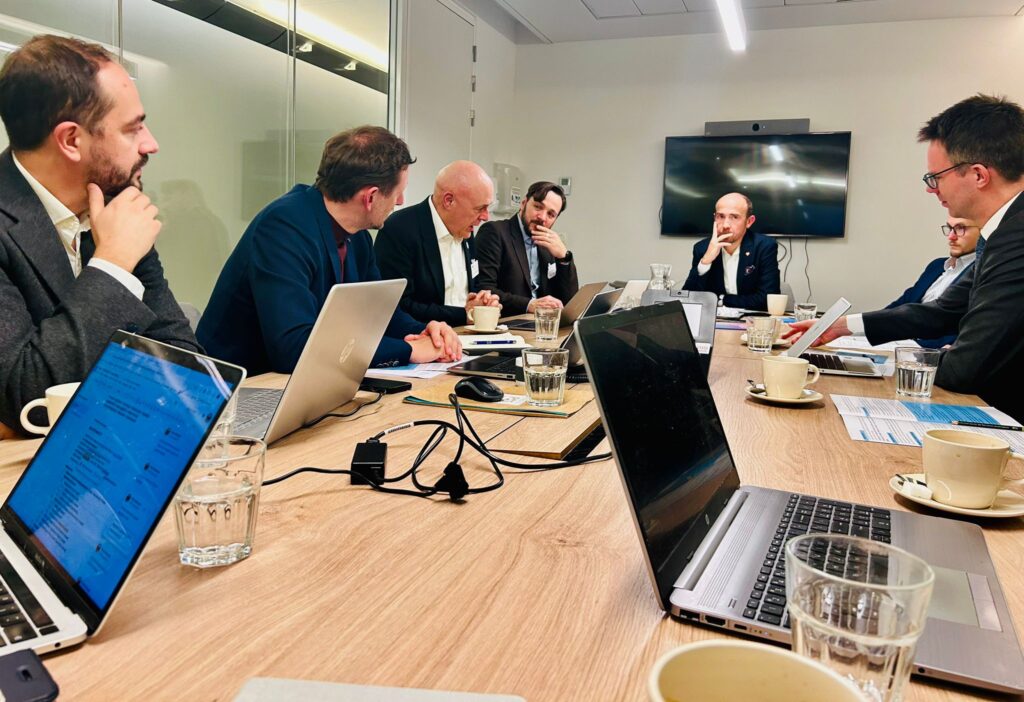
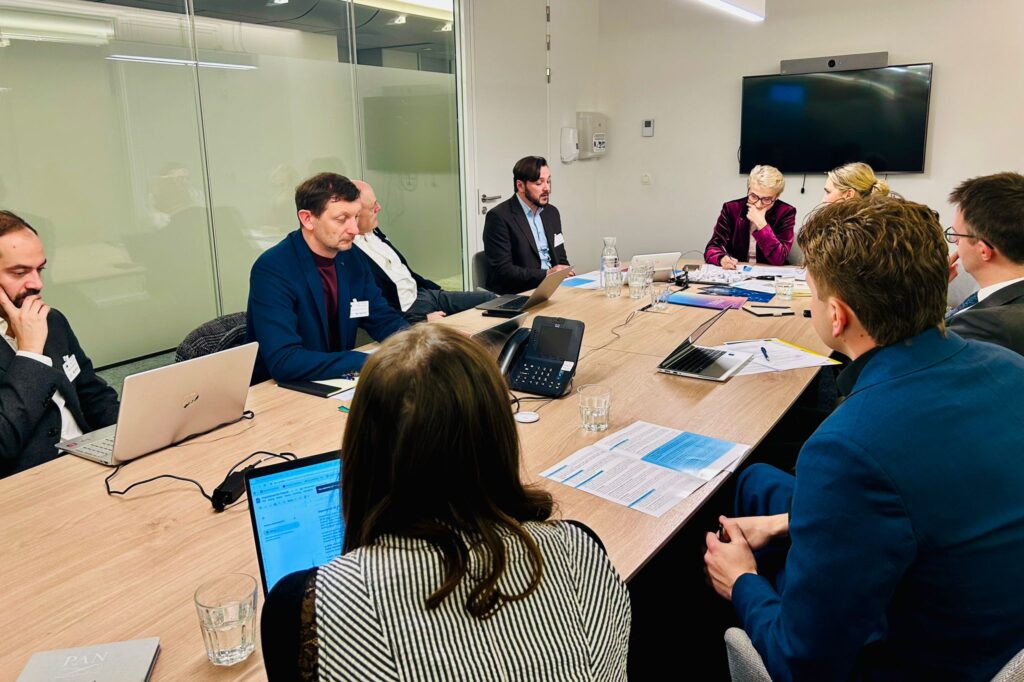
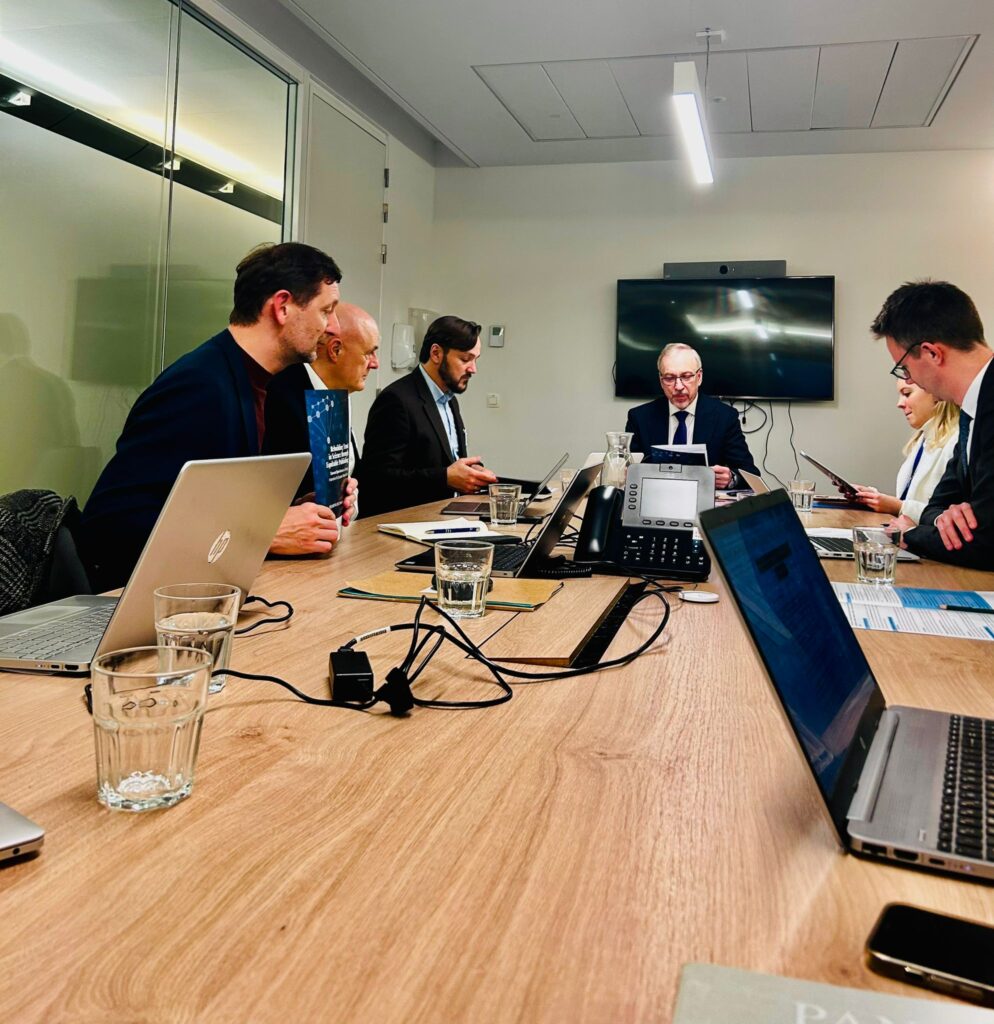
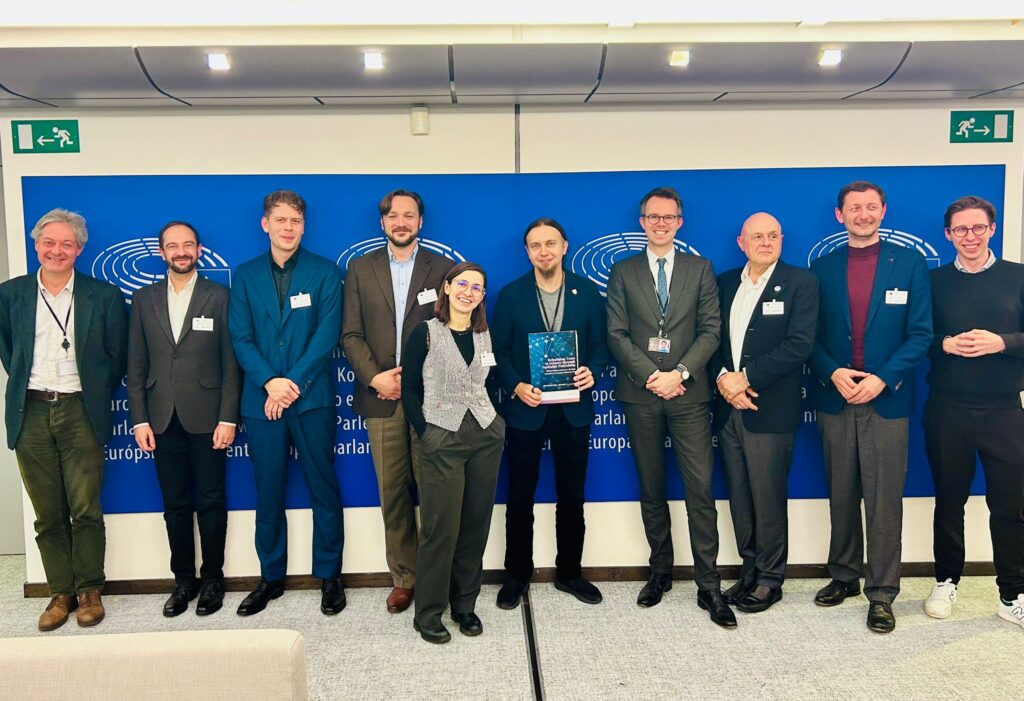
fot. Łukasz Pieczonka
Organizatorzy przedłożyli decydentom dokument zatytułowany „Rebuilding Trust in Science through Equitable Publishing”, w którym zdefiniowano Otwartą Naukę jako fundament „piątej swobody” UE – swobodnego przepływu wiedzy, oraz przedstawiono założenia Diamond OA. W rozmowach z politykami eksperci wyszli poza standardową argumentację, kładąc na stół twarde argumenty gospodarcze i geopolityczne.
Po pierwsze, wskazali na kwestię równości (Equitable Publishing). Przedstawiciele nauki mocno skontrastowali model diamentowy z komercyjnym, w którym wysokie opłaty za publikację (APC, en. Article Processing Charge), sięgające nawet 9 000 euro za artykuł, tworzą barierę nie do przejścia dla wielu badaczy i instytucji naukowych. Argumentowano, że taki system jedynie przesuwa konieczność opłacenia dostępu z czytelnika na autora, co jest marnotrawstwem publicznych środków. Diamond OA zaprezentowano jako alternatywę gwarantującą, że pieniądze podatników finansują badania i infrastruktury je upowszechniające, a nie marże komercyjnych wydawców.
Po drugie, poruszono krytyczny wątek suwerenności danych (Data Sovereignty). Eksperci zwrócili uwagę na niekorzystne uzależnienie Europy od infrastruktury zagranicznej – kluczowe dane naukowe przechowywane są na globalnych serwerach, poza jurysdykcją UE. Podkreślono, że wspieranie publicznej infrastruktury diamentowej to kwestia bezpieczeństwa strategicznego: pozwala Unii zachować kontrolę nad własnymi zasobami intelektualnymi, które są niezbędne m.in. do trenowania europejskich modeli sztucznej inteligencji (AI).
Po trzecie, odwołano się do zaufania do nauki. Eksperci podnosili, że komercyjne oligopole, nastawione na zysk i wolumen publikacji, tworzą zachęty mogące zagrażać rzetelności naukowej (np. zjawisko „paper mills”). Model diamentowy, zarządzany przez społeczność akademicką, przywraca kontrolę nad jakością merytoryczną instytucjom publicznym.
Ponadto, podczas spotkania z Posłem Kohutem oraz zespołem doradczym Posła Bartłomieja Sienkiewicza (EPP), dyskutowano nad kwestiami wielojęzyczności oraz wzmocnieniem demokracji w Europie poprzez naukę.
Konferencja Diamond ERA: spotkanie interesariuszy w Brukseli
Konferencja odbyła się w siedzibie Stałego Przedstawicielstwa Rzeczypospolitej Polskiej przy Unii Europejskiej – miejscu o szczególnym znaczeniu politycznym, podkreślającym aktywną rolę Polski w europejskiej debacie o przyszłości nauki i otwartej komunikacji badawczej.
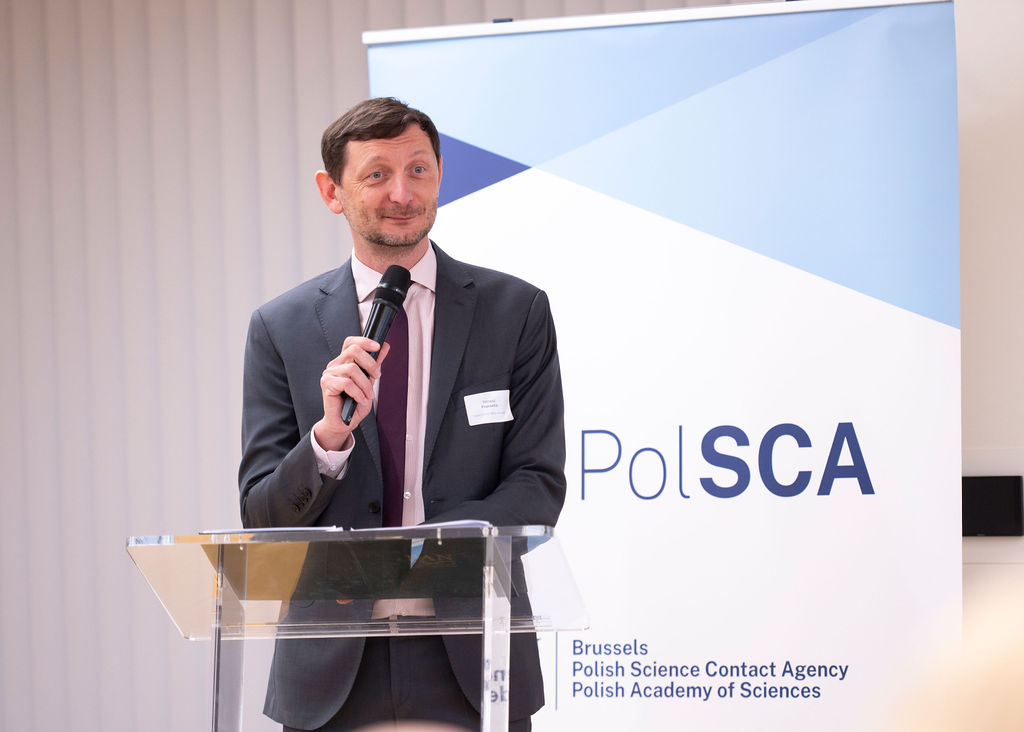
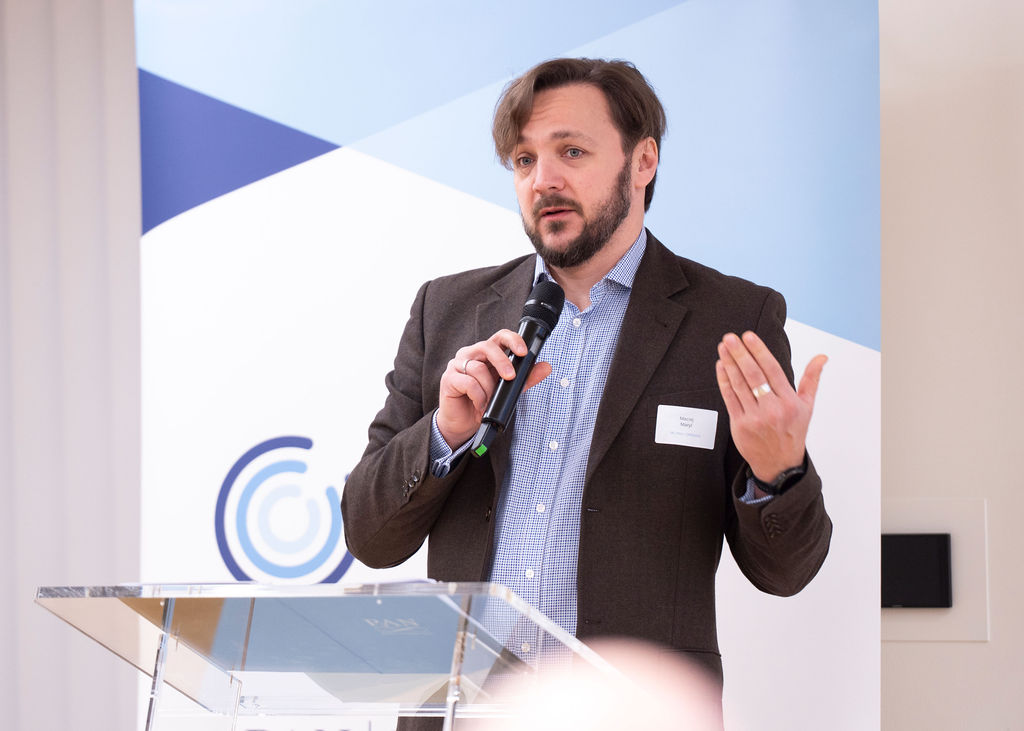
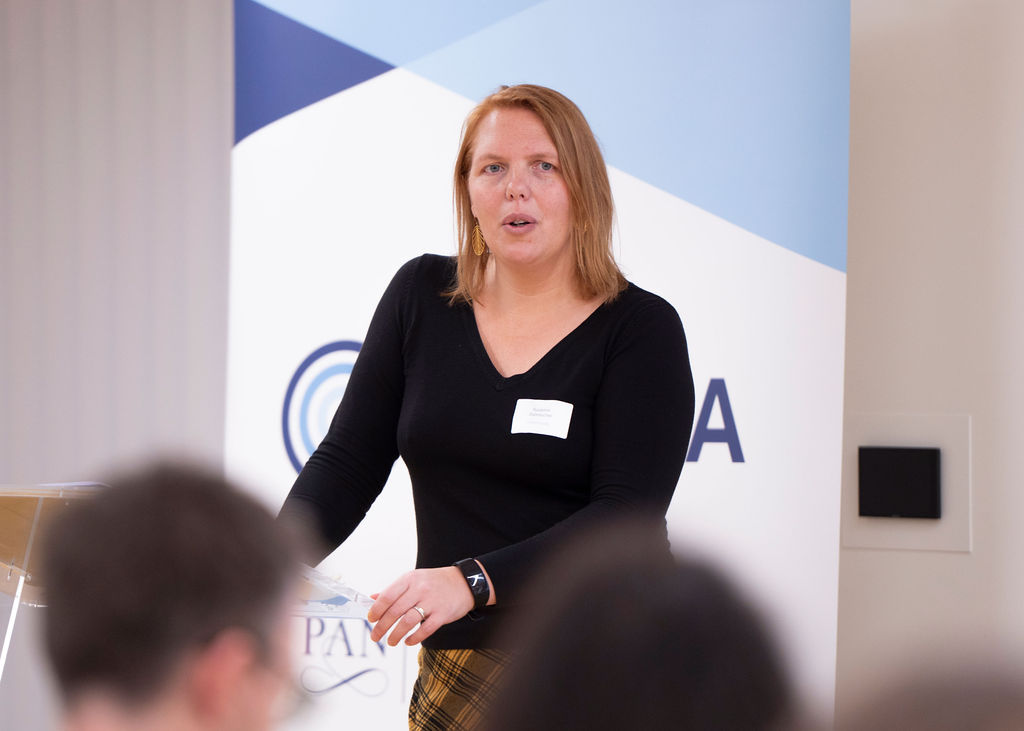
fot. Kinga Majewska
Uczestników konferencji przywitali w imieniu organizatorów: Tomasz Poprawka, dyrektor Biura PolSCA PAN w Brukseli, Maciej Maryl, kierownik Centrum Humanistyki Cyfrowej Instytutu Badań Literackich PAN, oraz Suzanne Dumouchel, dyrektorka ds. współpracy międzynarodowej CNRS i koordynatorka OPERAS. W swoich wystąpieniach otwierających podkreślili oni znaczenie współpracy między instytucjami krajowymi i europejskimi oraz rolę publicznych infrastruktur badawczych jako fundamentu trwałego i otwartego ekosystemu komunikacji naukowej w Europie.
Sesja 1: Polityczny konsensus wokół otwartej nauki
Merytoryczną część konferencji 4 grudnia otworzyła sesja poświęcona polityce naukowej, w której wybrzmiał rzadko spotykany konsensus między różnymi szczeblami zarządzania. Głos instytucji był spójny i zdecydowany.
Victoria Tsoukala z Komisji Europejskiej potwierdziła, że priorytetem Agendy ERA na lata 2025–2027 jest „równość w otwartej nauce” (Equity in Open Science). Wyjaśniła, że dla Komisji nie jest to tylko hasło, lecz konkretny program działań obejmujący: inwentaryzację wyzwań związanych z nierównościami, bezpośrednie wsparcie dla usług wydawniczych non-profit oraz dostarczanie wspólnych narzędzi i szkoleń podnoszących kompetencje w zakresie otwartej nauki. Wszystko to ma prowadzić do wypracowania spójnych rekomendacji dla polityki unijnej. Tsoukala zapowiedziała również przełomową zmianę: platforma Open Research Europe (ORE) do 2026 roku stanie się infrastrukturą zarządzaną kolektywnie przez instytucje badawcze, uniezależniając się od komercyjnych dostawców.
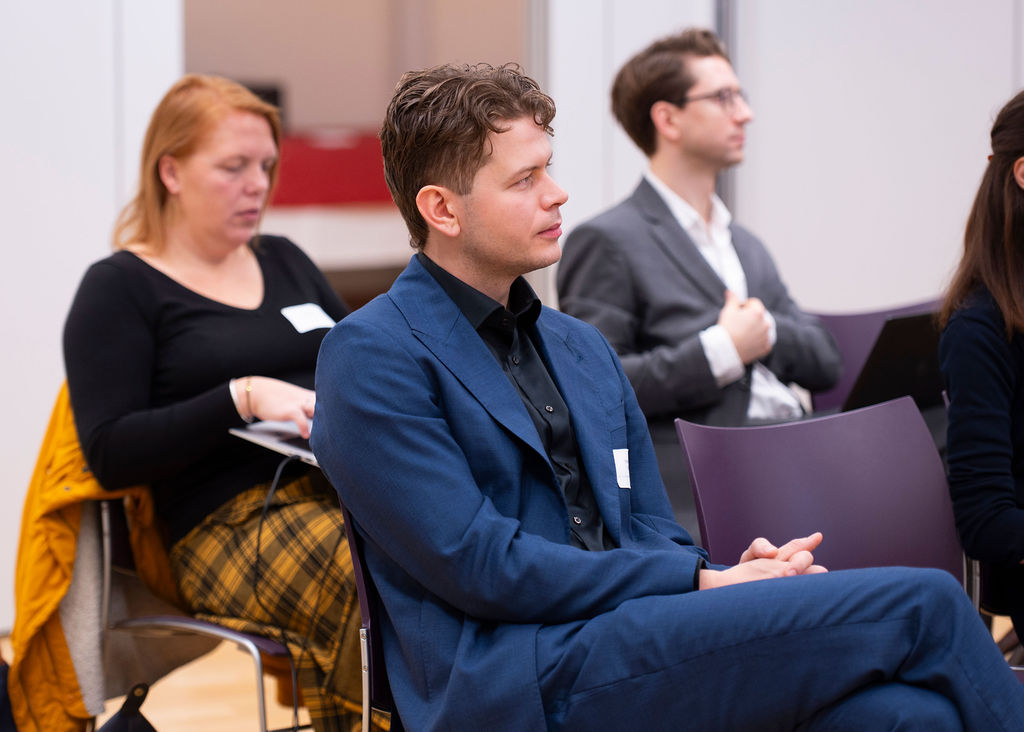
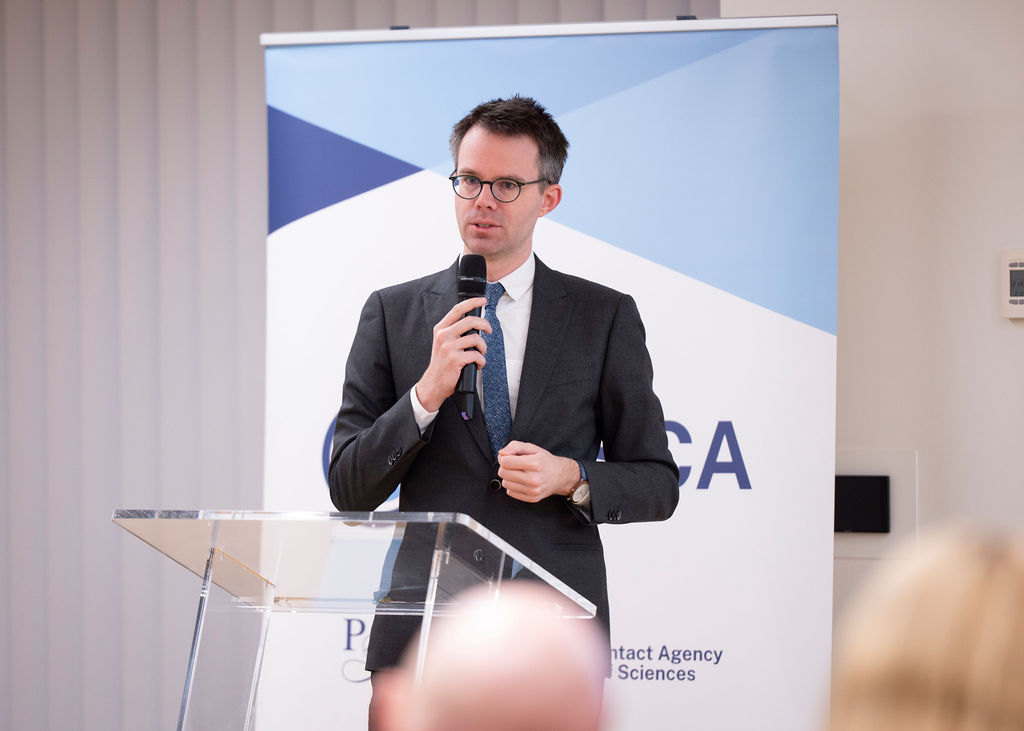
fot. Kinga Majewska
Z kolei Bregt Saenen (Science Europe) wskazał na bezprecedensowy konsensus polityczny, wzmacniany podczas globalnych szczytów Diamond OA. Podkreślił konieczność fundamentalnej zmiany paradygmatu finansowania: grantodawcy powinni odejść od modelu opłacania pojedynczych publikacji na rzecz systemowego inwestowania w trwałe i stabilne ekosystemy wydawnicze. Perspektywę tę dopełniła Ana Ranitovic (Uniwersytet w Groningen), argumentując, że uniwersytety muszą odzyskać cyfrową autonomię i rolę zarządców wiedzy, szczególnie istotną w czasach dezinformacji kryzysu zaufania do wiedzy naukowej, co wymaga jednak wsparcia legislacyjnego na poziomie unijnym (ERA Act).
Sesja 2: Praktyczne wdrożenia – wiele dróg do otwartości
Ta część konferencji pokazała, że model diamentowy działa skutecznie w różnych skalach i formatach.
Jako pierwsza wystąpiła Agnieszka Wiktor-Sass z Uniwersytetu im. Adama Mickiewicza w Poznaniu, prezentując platformę PRESSto. To przykład dobrze prosperującej instytucjonalnej platformy diamentowego otwartego dostępu: centralny zespół uniwersytecki przejmuje obsługę techniczną, prawną i szkoleniową dla blisko 100 czasopism. Dzięki wsparciu i szkoleniom (np. z zakresu SEO czy etyki COPE), redakcje mogą skupić się na merytoryce, mając zapewnione profesjonalne zaplecze.
Lucy Barnes z Open Book Publishers (OBP) przedstawiła model wydawniczy dla diamentowych monografii, podkreślając: „Książki to nie czasopisma – nie wrzucajmy ich do jednego worka”. OBP, działające od 2008 roku, udowadnia, że monografie mogą być otwarte bez embarga i opłat dla autorów. Kluczem jest mieszany model finansowania, na który składają się granty, dobrowolne darowizny, sprzedaż wersji drukowanych oraz innowacyjny program członkostwa bibliotecznego (ponad 270 bibliotek płacących roczną składkę). Taka dywersyfikacja źródeł przychodu zapewnia wydawnictwu odporność na wahania rynkowe.
Caroline Edwards z Open Library of Humanities (OLH) skupiła się na skalowaniu inicjatyw kierowanych przez naukowców (scholar-led). Edwards odwołała się do użytej wcześniej przez Johana Roorycka metafory publicznego parku – przestrzeni dostępnej dla wszystkich, ale wymagającej publicznych nakładów na utrzymanie. OLH działa jako konsorcjum finansowane przez biblioteki, co pozwala na przekształcenie (flipping) czasopism z modelu subskrypcyjnego na otwarty. Jej prezentacja pokazała, jak budować niezależne, masowe struktury wydawnicze, które pozostają własnością akademicką.
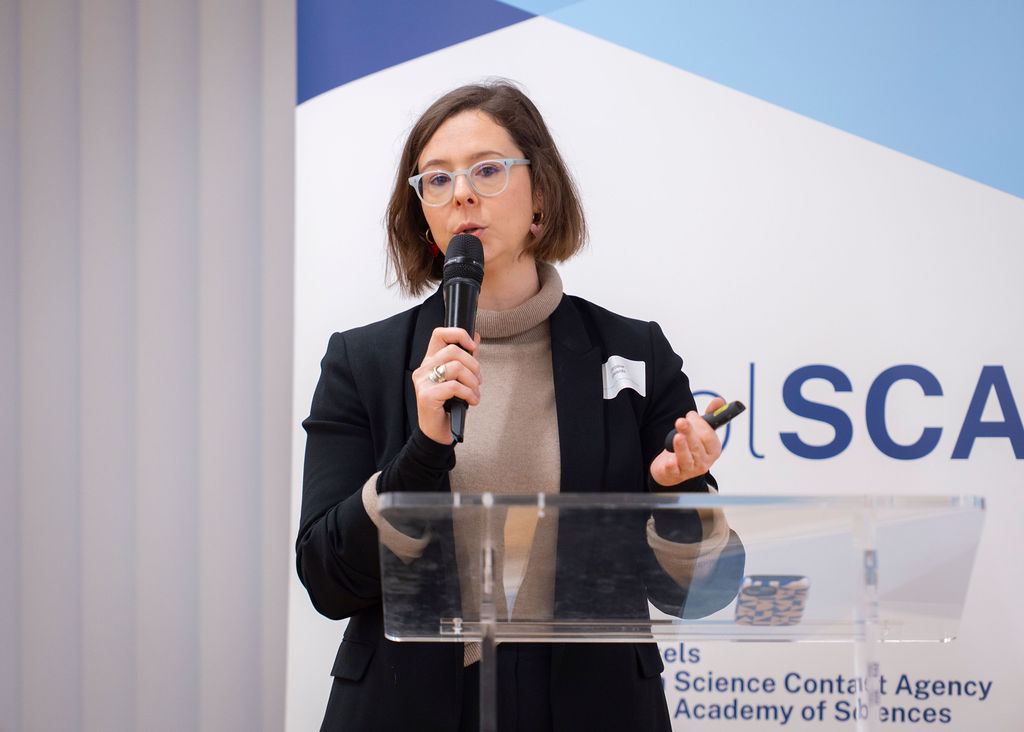
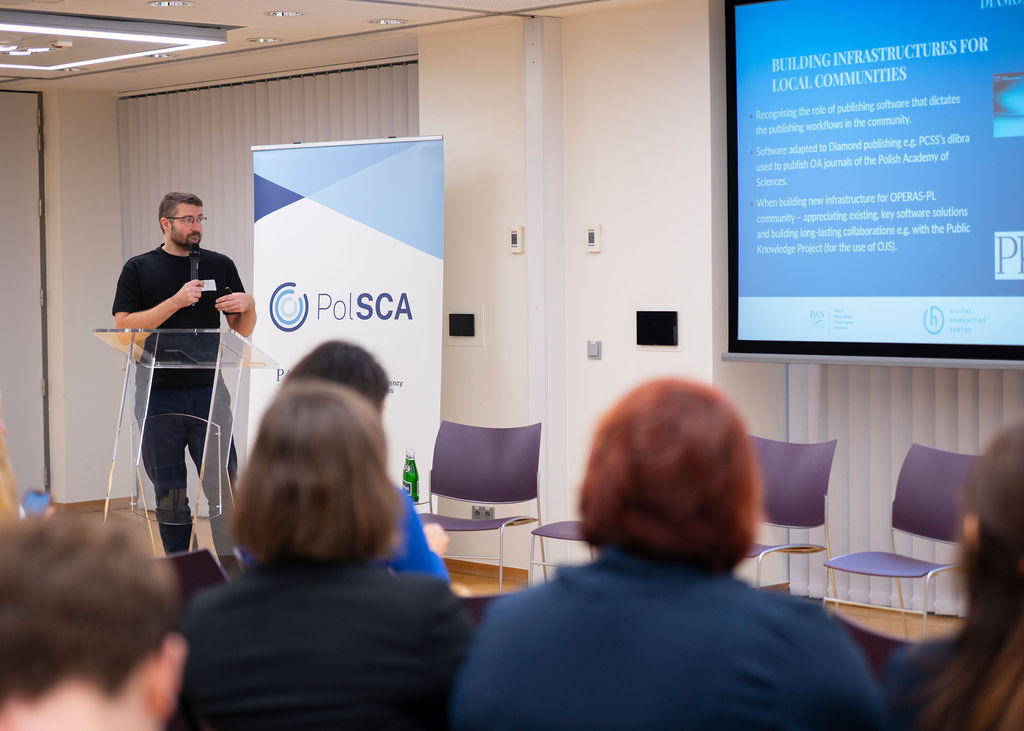
fot. Kinga Majewska
Perspektywę technologiczną wprowadził Tomasz Umerle z Poznańskiego Centrum Superkomputerowo-Sieciowego i OPERAS Innovation Lab. Zwrócił uwagę, że nowoczesna humanistyka wymaga potężnej mocy obliczeniowej (HPC) i adaptacji sztucznej inteligencji, tak by dostarczać użytkownikom innowacyjne usługi na bazie otwartych treści (jak np. chatboty). PCSS integruje lokalne rozwiązania z międzynarodowymi standardami, budując technologiczną suwerenność niezbędną do tego, by inicjatywy takie jak PRESSto czy OBP mogły konkurować w cyfrowym świecie.
Sesja 3: Jak to utrzymać? Wsparcie i zrównoważony rozwój
Ostatnia sesja poświęcona była strukturom, które mają zapewnić trwałość modelu diamentowego.
Dyskusję otworzyło wystąpienie Johana Roorycka, który nakreślił wizję systemowego wsparcia diamentowych publikacji w Europie poprzez współkoordynowany przez siebie program OPERAS pod nazwą European Diamond Capacity Hub (EDCH). Kluczowymi filarami tej inicjatywy są: Diamond Open Access Standard (DOAS), służący zapewnieniu jakości i standardów wydawniczych, oraz Diamas Toolsuite – centrum kompetencji oferujące specjalistyczne szkolenia dla redakcji. Uzupełnieniem ekosystemu będzie Diamond Discovery Hub – narzędzie mające na celu zwiększenie widoczności i odnajdywalności (discovery) europejskich czasopism diamentowych. Kluczem do sukcesu mają być Krajowe Centra Kompetencji (National Capacity Centres – NCC), tworzące sieć wsparcia w całej Europie (w Polsce rolę centrum kompetencji przejmie krajowy węzeł infrastruktury OPERAS – OPERAS-PL). Rooryck podkreślił znaczenie standardów (m.in. Diamond Open Access Standard – DOAS) oraz szkoleń, które pozwolą mniejszym wydawcom działać na najwyższym poziomie.
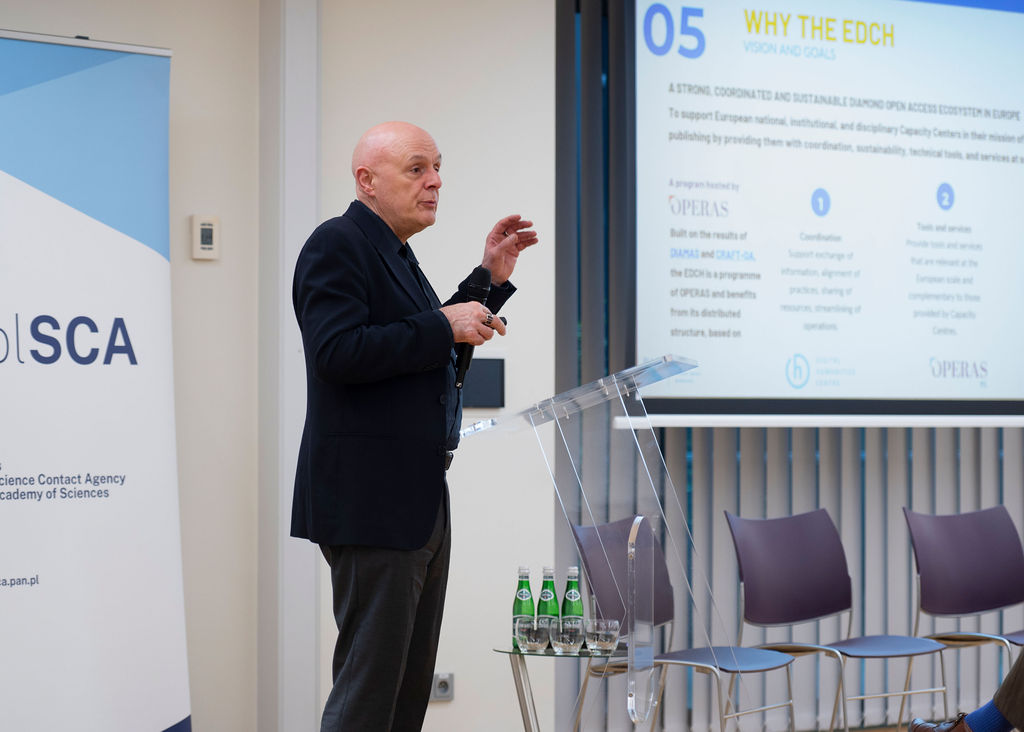
fot. Kinga Majewska
Podczas dyskusji panelowej po wystąpieniu Roorycka Suzanne Dumouchel (OPERAS/EOSC) wyjaśniła, że stabilność European Diamond Capacity Hub (EDCH) opiera się na trzech filarach: infrastrukturze badawczej OPERAS (jako projekcie ESFRI), integracji z federacją EOSC (European Open Science Cloud) oraz specjalnej grupie zadaniowej ds. finansowania. Taka konstrukcja ma gwarantować, że EDCH nie będzie jednorazowym projektem, lecz stałym elementem europejskiego krajobrazu naukowego.
Konkretny przykład wdrożenia tej wizji na poziomie narodowym zaprezentował Michael Kaiser z Max Weber Stiftung, omawiając projekt SeDOA (Service Centre for Diamond OA). Jest to niemiecki odpowiednik centrum kompetencji, finansowany przez Deutsche Forschungsgemeinschaft (DFG). SeDOA działa jako zdecentralizowana sieć 15 instytucji, oferująca jeden punkt dostępu dla usług wydawniczych. Kaiser omówił konkretne narzędzia, które SeDOA rozwija: od glosariusza i rejestru czasopism, przez „Drehscheibe” (hub dystrybucyjny), aż po innowacyjne „Ideathony” organizowane wspólnie z OPERAS.
Wydarzenie zamknęło wystąpienie Macieja Zdanowicza, który połączył wątki konferencji z szerszym kontekstem politycznym projektu Inspiring Era. Nawiązując do wcześniejszych warsztatów w Warszawie, Zdanowicz wskazał na konieczność tworzenia sieci „peer-learning” (wzajemnego uczenia się) między krajami członkowskimi. Zapowiedział publikację raportu i rekomendacji politycznych, które trafią bezpośrednio do Komisji Europejskiej, zamykając pętlę między praktykami a twórcami prawa.
Podsumowanie
Konferencję zamknęła sesja podsumowująca, w której wybrzmiał silny głos polskiej dyplomacji naukowej. Magdalena Kula, attaché ds. badań w Stałym Przedstawicielstwie RP przy Unii Europejskiej, podzieliła się kulisami trwających w Brukseli negocjacji. Wskazała, że na korytarzach unijnych dominują obecnie słowa-klucze (buzzwords) takie jak sztuczna inteligencja, która powinna być tworzona przez naukowców i dla naukowców, oraz „piąta swoboda”, której definicja jest wciąż wypracowywana. Zwróciła też uwagę na wyzwania definicyjne – obecne rozumienie infrastruktury badawczej i technologicznej w dokumentach UE bywa zbyt wąskie, a kwestie dostępu do danych i ich stabilności zyskują na znaczeniu.
Kluczowym momentem jej wystąpienia była jednak deklaracja dotycząca polskiej strategii. Kula podkreśliła, że dla Polski Diamond OA jest sposobem na zabezpieczenie komunikacji naukowej dla rodzimych badaczy. Co więcej, potwierdziła gotowość Ministerstwa do rozpoczęcia negocjacji w sprawie goszczenia infrastruktury OPERAS w Polsce, co stanowiłoby historyczny krok w rozwoju polskiej nauki.
Całość klamrą spiął Maciej Maryl (IBL PAN), przypominając w słowie końcowym, że fundamentem każdej zmiany technologicznej czy finansowej w nauce musi być reforma ewaluacji jakości działalności naukowej. Bez niej nawet najlepsze narzędzia i deklaracje polityczne nie zmienią trwale przyzwyczajeń środowiska akademickiego.

Prezentacje do pobrania
